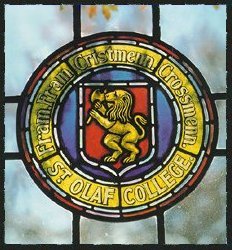
St. Olaf College
Global Semester
1978-1979

 |
St. Olaf College Global Semester 1978-1979 |
 |
|||
| Photos | Songs | ||||
| Flights |
Bob and Pam Jacobel were the leaders of the 1978-79 Global group. At the time, Bob was a junior professor at St. Olaf, actively involved in the Para-College. He's now one of St. Olaf's senior faculty... Not much older than the rest of us, Bob and Pam approached the trip with much of the same sense of wonder as the rest of us, sharing the experience not so much as leaders, but as excited participants. This section includes notes from Bob, as well as guidelines about what the supervisors were expected to do during the trip... Somehow, Bob and Pam helped assure we abided by St. Olaf's famous alcohol policy, and assured that none of us were expelled from the program... |
|
| Supervisor | ||
| Schedule | ||
| Accommodations | ||
| Baggage | ||
| Incidental | ||
|
FIELD SUPERVISOR'S INTRODUCTION (from the "Blue Book")
Welcome to the 1978-1979 St. 01af Global Semester. Although our departure date is still several months away, it is now time that we begin serious preparation for the learning experiences which will begin in September. The experience of a lifetime awaits us, and we wilt want to gain the most from this opportunity by careful planning. This blue book will be a useful guide to many of the operational questions which you wilt be asking as you begin to ready yourselves. Other essential information will come from our orientation sessions this spring, and of course the academic preparation wi11 begin with your summer reading.
The Global is not simply a sightseeing excursion, it is a time to learn and experience. Most of our itinerary has been preplanned by the Office of International Studies to enable us to concentrate on the academic aspects of the program. Our lectures, field trips, discussion sessions, and guided tours will be essential to this goal and attendance at these will be mandatory. I expect everyone to approach the academic program with the seriousness demanded by this incredible opportunity for gaining global awareness and understanding.
At our host institutions in each country you will team to adapt to different teaching strategies and styles. An important part of our learning will come from combining these academic sessions with what we experience from the culture and through our observations. We will all do well to develop this skill of integration to take full. advantage of the program. Each of us with our different backgrounds and interests will have varied reactions to the things we will encounter and it will be important that we learn to share these with each other in our discussions so as to expand and clarify our world view. A part of what can be gained from this will depend on the thoughtfulness of your preparation. There is much that we can begin reading now. It is also essential that we become extremely sensitive to the customs and values of people in other cultures. We will be conspicuous. We are, after all, visitors, and we must keep in mind that our behavior, as a group and individually, will determine their acceptance of us and of those who follow.
When contemplating a program of this scope, one cannot escape a simultaneous feeling of eager expectation and some anxious anticipation of what lies ahead. The possibilities for personal growth and an expanded awareness are enormous, and yet there will be days when we will approach saturation with cultural experience and our thoughts will turn toward home. The logistics for this venture are staggering and though the trip is largely preplanned, at times we will encounter the inevitable difficulties associated with travel. We wi11 be fatigued and our patience will be tried. Your resourcefulness, and the ability to adopt a philosophical perspective on these situations while maintaining a sense of humor, will be valuable strategies for coping. From time to time I will ask for your help to expedite handling luggage, passports, and visas, and the general routine of getting from place to place. The support and guidance we can give one another, and hence the dynamics of our interactions, will be very important. We will get to know each other far better than we would during any similar time period spent in the United States, and this will enrich our experiences.
We wi11 not always be comfortable. We will squeeze together onto public transportation, share the same intestinal disorders, and anticipate the luxury of clean clothes and a warm bath. But the closeness that we develop as a group and the excitement that we share in our learning will carry us over the rough spots. For Pam and myself, let me say that we can hardly wait for it a11 to begin in September. We'll see you soon.
Bob Jacobel, Field Supervisor |
||
|
FIELD SUPERVISOR'S AUTHORITY AND RESPONSIBILITY
In his relationship to participating students and persons representing cooperating institutions, the accompanying St. Olaf faculty member serves in a capacity combining all on-campus deanships. Thus he/she possesses full authority to act on behalf of St. Olaf College in academic matters, all personnel issues, and, within the limits of the program budget, in financial questions. To specify further what this entails is difficult since that authority will be exercised in day-to-day situations, many of which are unpredictable. When greater issues are involved, the field supervisor should discuss these with local coordinators and participants and reach decision on the basis of joint considered judgment. Subsequently, the field supervisor has the following authority:
The basic duties of the field supervisor, in addition to items spelled out above, are to coordinate all academic activities, teach the concurrent course in which all participants are required to be enrolled, and supervise all group activities. He may, of course, seek the assistance of the entire group or individuals in carrying out these duties.
Together with all participants the field supervisor and his wife will care for the safety and well-being of each member of the group, preserve, or improve upon the impression made by previous Globalites, point out the ever-present opportunities for learning in and out of the classroom, promote the best of relations with local populations, and make the entire Global Semester a continuous and positive experience in international living and learning.
|
||
|
A CLEAR WARNING Foreign visitors in countries abroad are particularly vulnerable when it concerns violations—intentional or unintentional—of local rules and regulations concerning alcohol and, in particular, drugs. The process of law and punishment is far more arbitrary than within the United States and more often than not may lead to prolonged imprisonment under sub-standard conditions. Consequently, it is of utmost importance for the welfare of the individual and the group that extreme caution and prudence be applied when it concerns these matters.
The Field Supervisor has complete authority to enforce the established College policy, stated in the College Handbook, 1977-78 on page 26:
The possession or consumption of alcoholic beverages is prohibited on campus, in college-owned student houses, and at college sponsored functions. Anyone intoxicated or otherwise violating college policy regarding alcoholic beverages may be subject to disciplinary action.
The College considers the use, possession, distribution, or sale of those drugs (hallucinogens, narcotics, stimulants, depressants) which are illegal except when taken under a doctor's prescription as contrary to the welfare of the college community. Students involved in such activities may be subjected to disciplinary action.
Violation of above rule will be severely dealt with and may even result in expulsion from the program and the immediate return to the United States of the person or persons involved. The cost of legal advise, fines, and return travel must be borne by the violator.
|
||
|
SUMMERTIME ASSIGNMENTS...
July 11, 1978
From your Field Supervisor:
Greetings from the Midlands! I hope you are all settling into an enjoyable and satisfying summer routine. This is indeed a very special summer in which we are readying ourselves for one of the greatest learning experiences of our lives. I hope you are all working to maximize this opportunity by devoting sufficient time to your reading preparation. I know how difficult this can be on a summer schedule (I'm facing these problems myself), but the reality of going unprepared would be like going on a long backpacking trip to an entirely new place and leaving behind the maps and compass.
I hope you are finding Brown and Schumacher thought provoking and are making good progress on the essay over these. We will be talking about many of their ideas in our discussion sessions, so you may want to be jotting down notes as you read. The assignment sheet has a mistaken reference to Ehrlich which was not changed when I dropped his book and substituted Brown's. I'm finding Brown quite wordy, but the scope of his work closely parallels the thrust of our study of developing technology and so is good background for us. As you are developing expertise in your area for the paper, keep in mind that our mode of operation will be discussion sessions and that even things which you may not wish to include in your paper will be useful. Read all you can, and come prepared to observe and share your learning with others.
Will each of you who signed up for the first aid committee begin to organize a small kit of supplies like you would buy in a car first aid kit. You might also want to add an ace bandage for sprains and moleskins for blisters. Everyone should bring their own supply of Lomotil (or equivalent), Aspirin, Vitamins and any prescription medicines. For those of you who plan to do any trekking (hiking) in Nepal, the government requires a trekking permit which we will obtain upon entry in Kathmandu. You will need two photos for this permit. Extra passport photos would be ideal.
Bob Jacobel
|
||